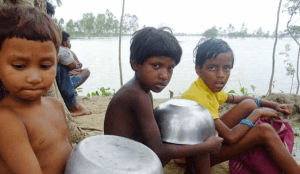A recent study conducted by Harvard University reveals a concerning statistic for India, with approximately 6.7 million children deprived of essential nutrition, marking them as ‘zero-food children’.

This figure constitutes nearly half of the total zero-food children across 92 countries scrutinised in the research. The term ‘zero-food children’ pertains to infants and toddlers aged between 6 and 23 months who have not consumed any milk, formula, or solid food within the preceding 24 hours. Comparisons drawn from the study indicate that India’s prevalence of zero-food children is akin to that of West African nations like Guinea, Benin, Liberia, and Mali, where malnutrition remains a significant challenge. However, the study’s findings have been met with rebuttals from Sanjeev Sanyal and Aakanksha Arora, esteemed members of the Economic Advisory Council to the Prime Minister.
Across low and middle-income nations, numerous children encounter obstacles in accessing adequate and nutritious sustenance, primarily due to socioeconomic and environmental factors. Consequently, undernutrition and deficiencies in essential micronutrients persist as pressing public health issues on a global scale. The research, published in the esteemed JAMA Network Open journal, scrutinised 276,379 children aged 6 to 23 months from diverse backgrounds in 92 countries, with a focus on their feeding practices as reported by caregivers.
The study’s analysis underscores the stark reality, revealing that zero-food children comprise a concerning 10.4% of the surveyed population. Prevalence rates vary significantly across different nations, ranging from a mere 0.1% in Costa Rica to a staggering 21.8% in Guinea. For India, accounting for nearly half of the zero-food children identified in the study, the prevalence stands at a significant 19.3%. This revelation underscores the urgent need for targeted interventions and comprehensive policies to address malnutrition and enhance access to adequate nutrition for vulnerable segments of the population.
The study’s authors, S.V. Subramanian, a distinguished professor of population health and geography, and Rockli Kim, a visiting scientist at the Harvard Center for Population and Development Studies, utilised nationally representative data collected between 2010 and 2022 from the aforementioned countries to conduct their comprehensive analysis. In light of these findings, urgent action and concerted efforts are imperative to mitigate the plight of zero-food children in India and other affected regions, ensuring a brighter and healthier future for the next generation. According to the authors, “The prevalence of zero-food children underscores the need for targeted interventions to improve infant and young child feeding practices and ensure optimal nutrition during this critical period of development. The issue is particularly urgent in West and Central Africa and India.”



